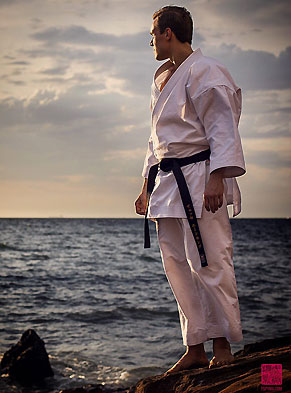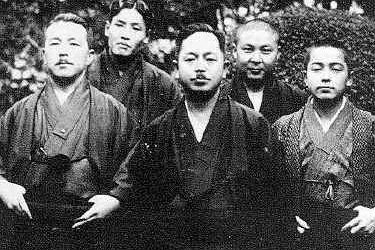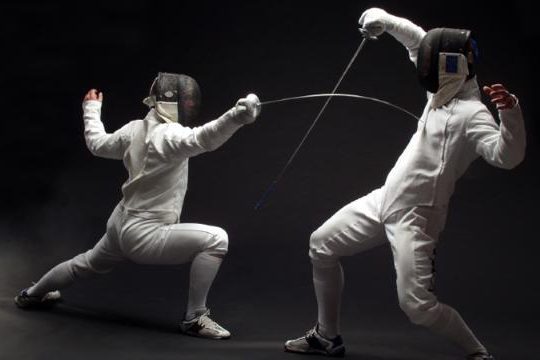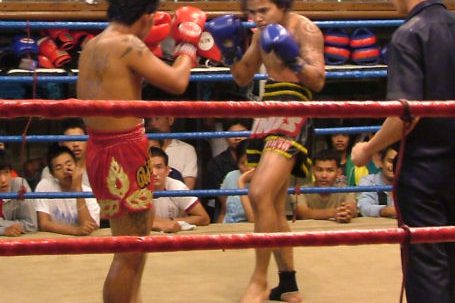Here’s a question I get a lot:

“Dear Jesse-san,
Training Karate alone is very hard for me. I know the key is to stay motivated & avoid getting bored – but the big question is how?
I would love to read your take on how to keep training when it is not possible to attend a dojo or get guidance from a sensei.”
Great question!
I have lots of experience training alone.
Allow me to split this article into a short answer & long answer.
Short Answer:
First of all, stop using the word “motivation”.
That’s just a word people made up so they can have an excuse to avoid doing boring stuff.
Because when you’re having fun you don’t need any “motivation”.
(Except motivation to quit!)
And that’s the first key.
Your training needs to be FUN.
But hey – nothing is fun all of the time.
For instance, sucking at things is not fun. And sometimes we just fail to remind ourselves of why we’re doing stuff in the first place. That’s the second key.
You see, I once heard that “motivation is remembering what you want”. If that’s true, then anyone who requires motivation to do stuff needs GOALS.
Remember what you want.
In summary:
- Have GOALS.
- Have FUN way to goals.
That’s it!
These 2 points will help you do Karate alone.
Long Answer:
Okay…
Let me tell you a story from when I lived in Okinawa – the birthplace of Karate.
To begin with; my apartment, located in the middle of Torihori village in Shuri district, was dirtier than a hobo in a mudwrestling match.
(Well, I personally didn’t think so, but my brother certainly did when he visited me – a fact which was made very clear upon his arrival.)
Yet, although I didn’t care much for cleaning my own apartment, I happily cleaned the local park once a month, together with my neighbors.
In other words, I cleaned up other people’s mess, but not my own!
Why?
Human nature is fascinating…
- Why are doctors smoking outside of the hospital, despite knowing the health risks?
- Why can some people be on point to work, but fail to pick up their own kids from school in time?
- Why do we give other people advice on diet, but don’t follow the advice ourselves?
Why can many Karate instructors teach people several hours a day, but fail to even train one hour on their own?
Do we lack mastery of ourselves?
I mean, we, Karate Nerds, are supposed to be real good at control and stuff, right? Both physical and mental.
So why didn’t you file your taxes last week? Why haven’t you done the dishes? How come you were reading that awesome Karate blog all day instead of finishing your dissertation?
I’ll tell you why:
Because these things are not “winnable”!
(Read that again.)
And if it’s something humans dislike, then it’s un-winnable stuff.
This is why silly mobile games, gambling and sports are so popular.
They’re short, fun and winnable.
And they have a goal!
You see, the reason to why I never bothered to clean my lizard infested apartment in Okinawa was that I couldn’t win at cleaning my apartment.
- There was no real starting time.
- There was no decided ending time.
- There certainly was no clear goal state.
The local park on the other hand…
“Okay, Jesse-san: When you arrive at 8 o’ clock tomorrow morning, cut this grass, put in these five plastic bags, throw onto this white truck, repeat until 10 o’clock, then eat this sweet bean jelly and go home.”
Perfect!
Cleaning the park had a guaranteed start time, a set end time, tons of fun subtasks and mini-games (hanging out with friends and dojo mates, practising my Japanese, playing with big stick-bugs) and even a sweet reward.
So I did it.
We all did it!
The same principle applies to your own Karate training.
Follow these 6 points:
1. Start by setting a proper (measurable & specific) goal.
Let’s say you want to improve your Karate, and generally become better. That’s your goal, okay?
Well – newsflash – you can’t measure your improvement if your goal is to become “better”.
Better than what? Better in which way? How? When? Why? It needs to be measureable & specific.
Instead of saying that you want to become “better”, say you want to get rid of “these five technical errors” that your sensei always tries to correct you on, or say that you will “get that next belt” (pass the grading test) or “do a perfect kata in a competition next week” (which is a measurable but hard goal).
These things are specific.
- Abtract goals = bad
- Specific goals = good
Next…
2. Split it up (mini goals).
Countless studies confirm that your chance of completing a task increases dramatically once you have started it.
No matter how small the start is!
Starting something sets a process in motion (in your brain) that will nag you constantly, until you finish the task.
So, use this to your advantage by making it easy to begin.
Take baby steps.
I mean, imagine if Game of Thrones, the coolest TV series on the planet, had been made into one 9-hour long episode, instead of ten 55-minute episodes? Nobody would want to see it, no matter how much explicit nudity, blood, violence and awesomeness it contains.
However – if you watch only one episode – you just neeeeeed to see the rest!
Use that principle.
It will help you overcome the resistance to start.
3. When internal motivation lacks, use external motivation.
You’re training your kata in the living room, when you notice the clock.
“Hey, isn’t Family Guy on?” Next thing you know, you’ve completely lost interest in training and you’re stuck in front of the TV.
Not good!
So, use external motivation to discipline yourself.
For example, a timer (i.e. maximum X minutes rest) or visual aid (when I lived in Okinawa, I used magnets on my fridge to keep track of how many kata I had left to do each day).
The possibilities are literally endless.
But perhaps the biggest external motivation is having a friend to train with, especially if you’re the social type. As a bonus, you can give each other feedback and practice kumite too!
Other external motivation includes Youtube, videos & books.
Or just subscribe to Karate Nerd Insider™.
Don’t be a martial artist. Be a smartial artist.
4. Get organized. Have routine.
Always set a start time.
Then set an end time, or a specific number of repetitions.
Then decide what will be done during this time, and how often it will be done.
Decide for how long this will go on (weeks, months, years?). You don’t need to write it down, just check with yourself.
Never allow yourself to be confused, because when we’re confused we freak out.
Personally, I prefer to write these things down.
Routine & clear rules are essential.
5. Reward yourself like a king.
“Wow, today I did really good! I’m freakin’ awesome!” you need to think after training.
Because when you’re practicing alone, nobody else is there to praise you after a successful workout.
That’s a huge downside of training alone; you don’t get that pat on your back (which most of us need).
So… you’ll simply have to reward yourself!
Give yourself something nice after training, and tell yourself that you can only have it AFTER training.
Of course, if your goal with training is to lose weight, then rewarding yourself with a fat chocolate bar is like shooting yourself in the foot.
You need to be smart here.
- After strength training? A yummy protein shake.
- After jogging? A nice lunch.
- After kata training? A fun movie.
It should be something you reeeeally enjoy.
Your special reward!
6. Switch it up. Cross-train.
We humans are hardwired for variation.
New things catch our attention and fire up our brain cells.
That’s why you need to have variety in your regular training.
Mixing variety with routine might sound like a paradox, but it’s not. You can schedule variety. Or, if you’re experienced, don’t schedule it at all. Improvise!
For instance, if you regularly train specific katas, try some new katas? If you regularly do jogging, try hill sprints? If you regularly do weight training, try only bodyweight exercises?
For optimum results, do stuff in the same general movement area as your primary thing (i.e. martial arts).
Your cross training should just momentarily break your habitual training pattern, but not mess up your Karate skills.
That’s it!
Follow these 6 points and you’re all set.
But remember – the most important thing is to have 1) clear goals and 2) a fun way to these specific goals.
Finally, one last piece of advice…
Never train Karate alone!
Train with yourself.
(Get it?)



44 Comments